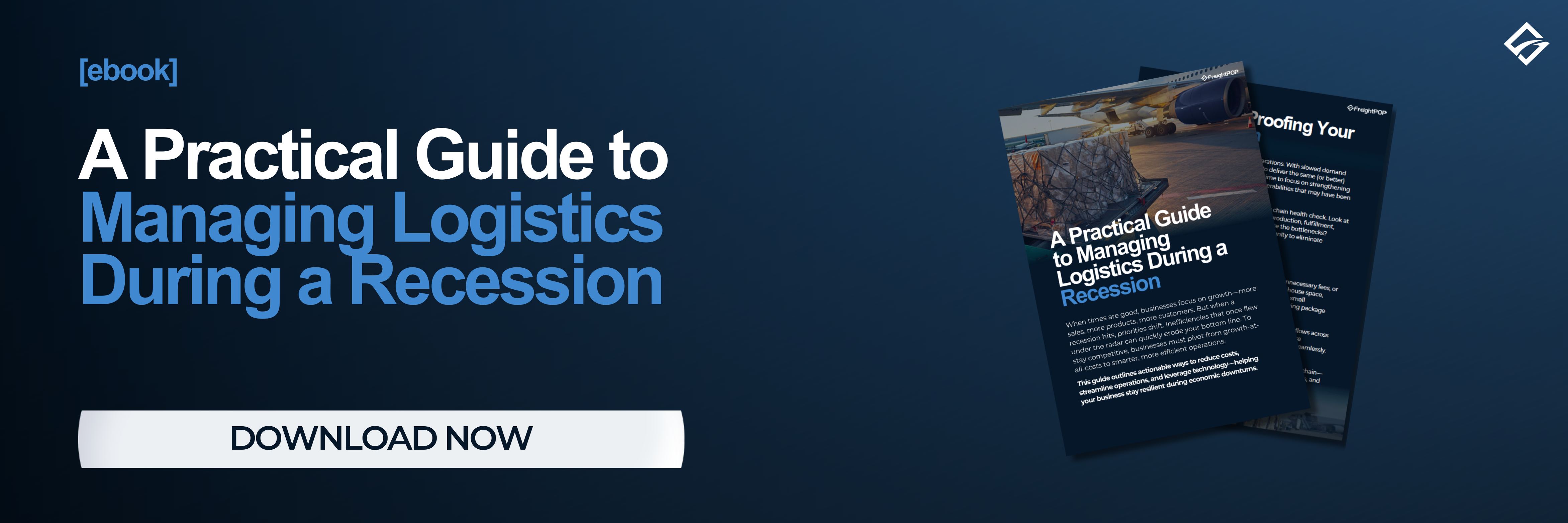4 Tips on Holiday Shipping & Freight
Looking to the future, how can shipping be optimized for the holidays? This past week we saw Cyber Monday evolve into Cyber Week. Just as it was...
.png)
In today's rapidly changing economic landscape, businesses are grappling with rising shipping costs due to tariff hikes, alongside the looming threat of recession. To remain resilient, companies must adapt their logistics strategies, focusing on cost efficiency and innovation. This blog post explores key strategies to help businesses navigate these challenges effectively.
A recession often reveals vulnerabilities within a supply chain that may have been overlooked during more prosperous times. When economic pressures mount, it's crucial to conduct a thorough supply chain health check. Examine each component, from procurement to customer service, to identify bottlenecks and inefficiencies. By addressing these gaps, businesses can safeguard their margins.
A comprehensive audit will help highlight areas of operational waste and unnecessary expenses. This is the ideal time to renegotiate carrier rates, optimize packaging sizes, and eliminate redundant tools. Streamlining these processes not only reduces costs but also positions your business to thrive during economic downturns.
Operational efficiency is critical when facing economic challenges. Automating repetitive tasks can significantly reduce labor costs and improve overall speed. Implementing integrated platforms that facilitate seamless communication across departments ensures that information flows quickly, enabling faster and more informed decision-making.
To achieve this, businesses must focus on eliminating excess spend and underutilized resources. Renegotiating contracts with suppliers and exploring regional carriers can offer more cost-effective solutions. By doing so, companies can maintain service quality while operating within tighter budgets.
Incorporating the right technology into your logistics operations can be a game changer, especially during a recession. An outdated, disconnected tech stack can hinder progress, whereas an integrated system enhances efficiency. Key tools to evaluate include ERP (Enterprise Resource Planning), WMS (Warehouse Management System), and TMS (Transportation Management System).
A TMS, in particular, provides real-time visibility into your shipping operations, allowing you to automate rate shopping and optimize routes. This not only reduces freight spend but also improves service levels. By embracing these technologies, businesses can make data-driven decisions, automate labor-intensive tasks, and ultimately cut costs.
Recessions provide the perfect opportunity to reevaluate vendor and carrier relationships. Start by assessing whether your current partners are delivering value, consistency, and cost-effectiveness. This is also an excellent time to explore opportunities for vendor consolidation, which can simplify operations and improve pricing.
Consider partnering with regional carriers that might offer faster or more affordable last-mile delivery options. By strengthening these relationships, businesses can enhance their logistics efficiency and remain competitive even in challenging economic climates.
Adapting inventory strategies is crucial in managing economic downturns. Begin by prioritizing high-margin and fast-moving SKUs to align inventory with real demand, rather than outdated forecasts. This approach helps improve inventory turnover and reduces carrying costs.
Flexible warehousing options, such as shared third-party logistics (3PL) spaces, can also offer significant benefits. They allow businesses to avoid long-term commitments and adapt quickly to changing demands. By reevaluating inventory strategies, companies can enhance their operational flexibility and better weather economic storms.
While recessions are difficult, they also serve as catalysts for change. Companies that emerge stronger from economic downturns are those that take proactive measures to address inefficiencies and innovate their operations. Turning uncertainty into opportunity requires a strategic mindset and willingness to embrace change.
Businesses should focus on strengthening partnerships, empowering teams, and simplifying outdated processes. By doing so, they can transform economic challenges into opportunities for growth and innovation. Implementing these strategies ensures that your business remains resilient and competitive, regardless of the economic climate.
Navigating the complexities of increased shipping costs and economic downturns requires a strategic approach to logistics. By recession-proofing supply chains, streamlining operations, leveraging technology, optimizing vendor relationships, and adapting inventory strategies, businesses can mitigate risks and seize opportunities. For a deeper dive into these strategies, download our comprehensive guide on practical ways to manage logistics during a recession. Download the guide here and equip your business with the insights needed to thrive in any economic environment.


Looking to the future, how can shipping be optimized for the holidays? This past week we saw Cyber Monday evolve into Cyber Week. Just as it was...

What's that? You need the best tools to save money on freight and shipping? Check out these seven tips to target the best TMS features that will do...

If you have a TMS or use shipping software, you know the benefits that automating your shipping process can bring. If you don’t have a TMS or use...